Reviews
Anthony Mann
USA, 1945
Credits
Review by Glenn Heath Jr.
Posted on 25 January 2013
Source DVD
Categories Noir Mann
Two distinct worlds exist in The Great Flamarion, Anthony Mann’s sharp 1945 film noir about a lip-smacking vaudeville femme who finally meets her match in the titular sharp shooter played by Erich von Stroheim. There’s the stage itself, a public and artificial platform where flawless presentation and professionalism are mere facades for acts of jealousy and rage occurring off-screen. Behind the curtain lives a whole other deceptively brutal hornet’s nest of sad sap losers, dangerous women, and wise-cracking bit characters, basically the perfect environment for a triple cross. When juxtaposed effortlessly, as Mann does through the serpentine plot, these two spaces form something of an earthly purgatory where ill-fated characters wait (and perform) before meeting their inevitable demise.
The Great Flamarion opens with an impressive long take following behind patrons entering a Mexico City theater as musicians strum their guitar cords on the distant stage. It’s almost as if the camera is being lured in along with the audience, getting bunched up behind a wall of bodies at the entrance before rising above the ground and moving fluidly toward the action. When piercing screams and gunfire interrupt the performance of a Chaplin-like clown, the darkly comic irony is reminiscent of the prologue in Hitchcock’s The 39 Steps. The rest of the film unfolds in standard flashback mode as the bullet-riddled Flamarion recounts his tale of deceit, betrayal, and murder to the aforementioned jokester, framing his typical Noir downfall as Shakespearean tragedy.
Initially, Flamarion is represented as the consummate professional, dedicating all of his time to target practicing in his dressing room with a pellet gun to strengthen his eye sight. “Only tonight interests me,” he barks to his viper of an assistant, Connie. Of course, when it comes to women, he can’t see the black hole of trouble that’s standing right in front of him. To Mann’s credit, he doesn’t make Flamarion out to be a complete heel, just a proud man delusional enough to think his formidable prowess as a performer equates to convincing appeal. It all stems from the arrogance that can be attributed to basically every performer in the film, despite their shady motivation or immorality.
Even more interesting is that the seduction process doesn’t happen overnight; Connie takes her time breaking Flamarion down, pitting him against her drunken husband Al with perfectly timed jabs and dramatic confessionals. There’s a process to her evil, and she’s had plenty of time to perfect it. While the two men are polar opposites of each other, the former an asexual brute, the latter a sad sack louse, Connie plays them equally with very little difficulty. She eventually melts Flamarion’s stoic growl and stiff posture, revealing him to be a man more interested in friendship and camaraderie than sex. “The guns were my only friend until I met you,” Flamarion whispers to Connie, sinking deeper into her quicksand with every syllable.
When the proverbial shoe finally drops, and Flamarion plugs Al with a perfectly place bullet round to the gut, Mann splits the rest of the film into two parts. The first involves Flamarion waiting for Connie to join him in Chicago after the both survive the criminal investigation that follows Al’s murder. He spends lavishly on hotel amenities anticipating her arrival, still convinced she will show up on the agreed upon date. When Connie doesn’t appear, Flamarion spends the rest of his cash (and the film) travelling around the country trying to find her. This second part reveals survival to be the central theme of The Great Flamarion. Like Connie, Flamarion is forced to address his true self while descending toward the poorhouse, admitting to his own nasty streak while begging for coins. By turning Flamarion into a vagabond hell bent on seeing Connie one last time, Mann primes him for the ultimate betrayal to come.
If The Great Flamarion isn’t on par with some of Mann’s great Noirs like Border Incident and The Tall Target, films that manage to subvert genre conventions and highlight dynamic milieus, it does dissect the male (and female) ego in fascinating ways. Through his character’s various levels of angst, Mann argues that we are all guilty of being fallible to something, whether it’s a beauty batting her eyelashes, a stiff drink, or the assumption that guns produce confidence. The Great Flamarion suggests that if life is one long perpetual balancing act, to lose focus means to miss the target, in more ways that one.
More Noir Mann
-
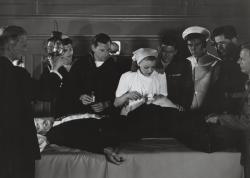
Strangers in the Night
1944 -
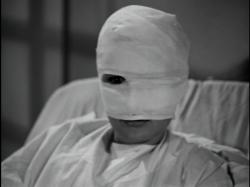
Strange Impersonation
1946 -
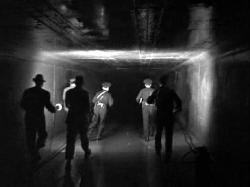
He Walked By Night
1948 -
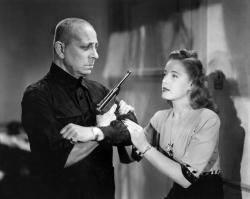
The Great Flamarion
1945 -
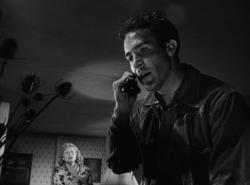
Border Incident
1949 -
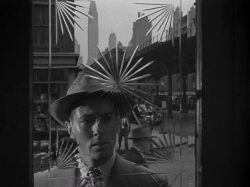
Side Street
1950 -
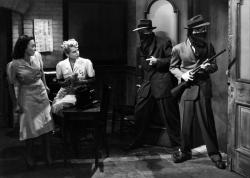
Railroaded
1947
We don’t do comments anymore, but you may contact us here or find us on Twitter or Facebook.



